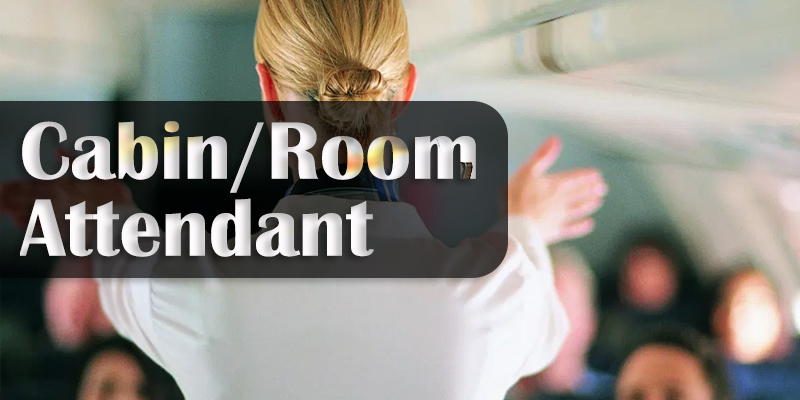
शिल्पकार प्रशिक्षण योजना (CTS) - केबिन/रूम परिचर पूर्ण पाठ्यक्रम
ट्रेड का नाम: केबिन/रूम परिचर (Cabin/Room Attendant)
NSQF स्तर: लेवल 4
अवधि: 1 वर्ष
प्रवेश योग्यता: 10वीं कक्षा उत्तीर्ण
उद्देश्य: होटल, रिसॉर्ट, और परिवहन सेवाओं में केबिन/रूम की सफाई, रखरखाव, और अतिथि सेवा में कौशल विकास।
पाठ्यक्रम अवलोकन
केबिन/रूम परिचर ट्रेड का पाठ्यक्रम अतिथि सत्कार उद्योग में सफाई, रखरखाव, और ग्राहक सेवा पर केंद्रित है। यह सैद्धांतिक और व्यावहारिक प्रशिक्षण को संतुलित करता है, जिसमें 70% व्यावहारिक और 30% सैद्धांतिक प्रशिक्षण शामिल है।
- ट्रेड थ्योरी
- ट्रेड प्रैक्टिकल
- वर्कशॉप गणना और विज्ञान
- इंजीनियरिंग ड्राइंग
- रोजगार कौशल
विस्तृत पाठ्यक्रम
1. ट्रेड थ्योरी
- अतिथि सत्कार उद्योग का परिचय: होटल, रिसॉर्ट, और परिवहन सेवाओं का महत्व।
- केबिन/रूम रखरखाव: सफाई प्रक्रियाएं, बिस्तर बनाना, और कमरे की सजावट।
- स्वच्छता और सुरक्षा: सफाई एजेंट, स्टरलाइजेशन, और व्यक्तिगत स्वच्छता।
- उपकरण और सामग्री: वैक्यूम क्लीनर, सफाई रसायन, और लिनन प्रबंधन।
- ग्राहक सेवा: अतिथि संवाद, शिकायत निवारण, और पेशेवर व्यवहार।
- पर्यावरण प्रबंधन: अपशिष्ट निपटान, जल संरक्षण, और पर्यावरण-अनुकूल प्रथाएं।
- सुरक्षा नियम: अग्नि सुरक्षा, प्राथमिक चिकित्सा, और आपातकालीन प्रक्रियाएं।
- हाउसकीपिंग प्रबंधन: इन्वेंट्री प्रबंधन और कार्य अनुसूची।
2. वर्कशॉप गणना और विज्ञान
- गणना: सफाई सामग्री की मात्रा, लागत गणना, और समय प्रबंधन।
- विज्ञान: सफाई रसायनों के गुण, पीएच, और पर्यावरणीय प्रभाव।
- अनुप्रयोग: सफाई प्रक्रिया में रसायन मिश्रण और समय गणना।
3. इंजीनियरिंग ड्राइंग
- मूल ड्राइंग: रेखाचित्र और आयाम।
- कमरे का लेआउट: होटल रूम या केबिन का डिजाइन और कार्यप्रवाह।
- उपकरण ड्राइंग: सफाई उपकरणों के सरल चित्र।
4. रोजगार कौशल
- संचार कौशल: अतिथियों और सहकर्मियों के साथ प्रभावी संवाद।
- आईटी साक्षरता: एमएस ऑफिस, बुकिंग सॉफ्टवेयर, और इन्वेंट्री प्रबंधन।
- उद्यमिता: स्वतंत्र हाउसकीपिंग सेवाएं शुरू करना।
- कार्य नैतिकता: समय प्रबंधन, स्वच्छता, और व्यावसायिकता।
- सुरक्षा: कार्यस्थल सुरक्षा, प्राथमिक चिकित्सा, और रासायनिक हैंडलिंग।
5. ट्रेड प्रैक्टिकल
- कमरे की सफाई: बिस्तर बनाना, फर्श और सतहों की सफाई, और बाथरूम सैनिटाइजेशन।
- लिनन प्रबंधन: बेडशीट, तौलिया, और अन्य लिनन की धुलाई और प्रबंधन।
- उपकरण संचालन: वैक्यूम क्लीनर, फ्लोर पॉलिशर, और स्टीम क्लीनर का उपयोग।
- सफाई रसायन: डिटर्जेंट, सैनिटाइजर, और डियोडोरेंट का उपयोग।
- ग्राहक सेवा: अतिथि स्वागत, कमरे की जांच, और शिकायत निवारण।
- अपशिष्ट प्रबंधन: कचरा पृथक्करण और पर्यावरण-अनुकूल निपटान।
- सुरक्षा अभ्यास: अग्नि निकास ड्रिल और प्राथमिक चिकित्सा प्रशिक्षण।
- प्रोजेक्ट कार्य: एक होटल रूम या केबिन की पूर्ण सफाई और सजावट।
परीक्षा पैटर्न
परीक्षा में प्रैक्टिकल और कंप्यूटर आधारित टेस्ट (CBT) शामिल हैं।
- प्रैक्टिकल: 300 अंक (सफाई, उपकरण संचालन, और ग्राहक सेवा)।
- CBT: 150 अंक, 75 प्रश्न, 2 घंटे (ट्रेड थ्योरी, वर्कशॉप गणना और विज्ञान, इंजीनियरिंग ड्राइंग, रोजगार कौशल)।
- परीक्षा समय: दिसंबर (CTS), जुलाई/अगस्त (AITT/ATS)।
- प्रमाणन: उत्तीर्ण उम्मीदवारों को NCVT से राष्ट्रीय व्यापार प्रमाणपत्र (NTC) प्राप्त होता है।
संसाधन
- DGT वेबसाइट से पाठ्यक्रम और अपडेट डाउनलोड करें।
- भारत स्किल्स पर ई-लर्निंग सामग्री, वीडियो, प्रश्न बैंक, और मॉक टेस्ट।
- CSTARI पर NSQF-अनुपालक पाठ्यक्रम विवरण।
नोट: अन्य भाषाओं में पाठ्यक्रम देखने के लिए भाषा स्विचर का उपयोग करें। पीडीएफ डाउनलोड के लिए यहां क्लिक करें।
Trade Type
Below is the Trade Theory syllabus for the ITI Trade "Cabin/Room Attendant" in English, based on the context provided earlier. Since "Cabin/Room Attendant" is not a standalone trade under the NCVT framework but aligns with hospitality-related trades, this syllabus is tailored to the role’s requirements (e.g., room maintenance and guest services in hotels, airlines, railways, or cruise ships). It focuses on the theoretical knowledge needed for the job.
Trade Theory Syllabus for ITI Trade "Cabin/Room Attendant"
- Introduction to Cabin/Room Attendant Role
- Definition and significance of the Cabin/Room Attendant in the hospitality and transport industries.
- Responsibilities: cleaning, maintaining cabins/rooms, and assisting guests.
- Overview of employment opportunities in hotels, airlines, railways, and cruise ships.
- Hygiene and Sanitation
- Importance of personal hygiene: grooming, uniform standards, and hand washing.
- Principles of sanitation in cabins, rooms, and public areas.
- Types of cleaning agents: detergents, disinfectants, and their safe use.
- Methods to prevent cross-contamination and maintain infection control.
- Cleaning Tools and Equipment
- Classification of cleaning tools: brooms, mops, brushes, and dusters—用途 (uses) and features.
- Functions of equipment: vacuum cleaners, floor polishers, washing machines.
- Safe handling and storage of cleaning chemicals and tools.
- Basic maintenance of equipment to ensure operational efficiency.
- Room Setup and Maintenance
- Techniques of bed making: hospital corners, duvet folding, and layering sheets.
- Arrangement of room amenities: toiletries, towels, water bottles, and stationery.
- Furniture care: dusting, polishing, and minor upkeep.
- Procedures for inspecting rooms/cabins and reporting damages or repairs.
- Guest Services
- Basics of guest interaction: greeting, politeness, and understanding needs.
- Handling common requests: extra bedding, toiletries, or refreshments.
- Protocols for managing lost and found items: documentation and reporting.
- Importance of confidentiality and privacy in guest areas.
- Safety and Emergency Procedures
- Fire safety: types of extinguishers, their uses, and evacuation routes.
- First aid knowledge: treating cuts, burns, and fainting incidents.
- Security measures: identifying suspicious activities and ensuring guest safety.
- Accident prevention: safe lifting techniques and avoiding hazards.
- Hospitality Industry Overview
- Structure of hospitality operations in hotels, transport, and tourism sectors.
- Role of the Cabin/Room Attendant in coordination with housekeeping, front office, and maintenance teams.
- Industry standards: cleanliness, guest satisfaction, and time management.
- Quality Standards
- Criteria for room/cabin cleanliness and presentation (e.g., spotless surfaces, odor control).
- Identifying poor quality: stains, dust, or malfunctioning amenities.
- Corrective actions to meet hospitality benchmarks.
- Basic Entrepreneurship
- Opportunities for self-employment in housekeeping or cleaning services.
- Understanding supply costs: cleaning materials, linens, and equipment.
- Basics of customer service for small-scale hospitality ventures.
This Trade Theory syllabus provides a solid foundation for understanding the duties of a Cabin/Room Attendant, emphasizing hygiene, guest service, and safety. It aligns with the broader hospitality training framework under NCVT and prepares students for practical application in real-world settings. Let me know if you’d like further adjustments or additional details!
- 5 views